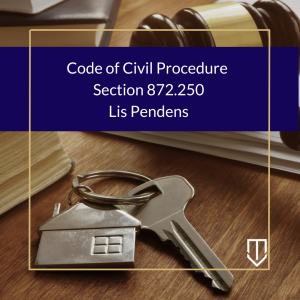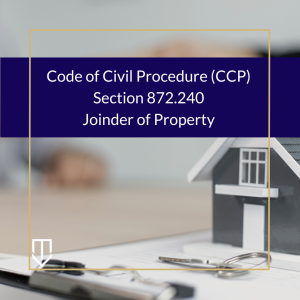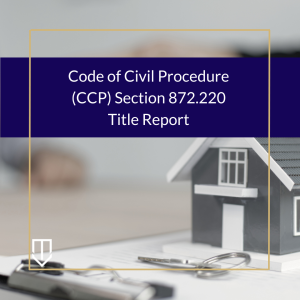 Generally, an owner can never legally “abandon” title to property. (Gerhard v. Stephens (1968) 442 P.2d 692, 713.) Instead, abandonment can only be found in situations dealing with personal property. Yet when the property interests in real property are in the nature of incorporeal hereditaments, the California Supreme Court has found that those interests can be abandoned.
Generally, an owner can never legally “abandon” title to property. (Gerhard v. Stephens (1968) 442 P.2d 692, 713.) Instead, abandonment can only be found in situations dealing with personal property. Yet when the property interests in real property are in the nature of incorporeal hereditaments, the California Supreme Court has found that those interests can be abandoned.
For a person to abandon property, or a right in property, there needs to be a nonuse accompanied by unequivocal and decisive acts on the part of the nonuser clearly showing an intention to abandon. (People v. Southern Pacific Co. (1916) 158 P. 177, 180.) Accordingly, in order to find abandonment, a trier of fact must find that the owner clearly and convincingly demonstrated the necessary intent to abandon. (Gerhard v. Stephens (1968) 442 P.2d 692, 713.)
What is an Incorporeal Hereditament?
 California Partition Law Blog
California Partition Law Blog


 What is an Ouster (Civ. Code § 843)?
What is an Ouster (Civ. Code § 843)? Generally, when obtaining representation for yourself and your property interests, you must make sure that your interests are indeed being protected and your wishes respected as much as legally possible. The moment it becomes clear that your attorney is not acting accordingly, it may be time to change your lawyer.
Generally, when obtaining representation for yourself and your property interests, you must make sure that your interests are indeed being protected and your wishes respected as much as legally possible. The moment it becomes clear that your attorney is not acting accordingly, it may be time to change your lawyer. The California Partition Law begins at Code of Civil Procedure section 872.010 and ends at Code of Civil Procedure section 874.323. Section 872.250 outlines the procedure for a plaintiff seeking a partition of real property to record a lis pendens with the county office.
The California Partition Law begins at Code of Civil Procedure section 872.010 and ends at Code of Civil Procedure section 874.323. Section 872.250 outlines the procedure for a plaintiff seeking a partition of real property to record a lis pendens with the county office.  Generally, every owner of property is liable for injuries on their property when it is not in a reasonably safe condition. (Cody F. v. Falletti (2001) 92 Cal.App.4th 1232.) If a party was a
Generally, every owner of property is liable for injuries on their property when it is not in a reasonably safe condition. (Cody F. v. Falletti (2001) 92 Cal.App.4th 1232.) If a party was a  If you’re venturing into a real estate transaction and are daunted by the contracts, you’re certainly not alone. The jargon and intricate legal parlance can often make these contracts seem more complex than they actually are. Yet, the good news is that, armed with some guidance and understanding, these contracts become much less intimidating. Our friends at
If you’re venturing into a real estate transaction and are daunted by the contracts, you’re certainly not alone. The jargon and intricate legal parlance can often make these contracts seem more complex than they actually are. Yet, the good news is that, armed with some guidance and understanding, these contracts become much less intimidating. Our friends at  The California Partition Law begins at
The California Partition Law begins at  Frequently, when homeowners are dealing with financial difficulties, equity purchasers may induce homeowners to sell their homes for a fraction of the price. An “equity purchaser” is anyone who acquires title to any residence in foreclosure, with some exceptions. (Cal. Civ. Code § 1695.1(a)). The California legislature believed that homeowners were losing their homes to foreclosure due to “fraud, deception, and unfair dealing by home equity purchasers.” (Cal. Civ. Code § 1695). To combat these instances of deceit, the Legislature implemented the Home Equity Sales Contract Act, found in Title 5 of the California Code of Civil Procedure, Chapter 2.5, sections 1695.1-1695.16.
Frequently, when homeowners are dealing with financial difficulties, equity purchasers may induce homeowners to sell their homes for a fraction of the price. An “equity purchaser” is anyone who acquires title to any residence in foreclosure, with some exceptions. (Cal. Civ. Code § 1695.1(a)). The California legislature believed that homeowners were losing their homes to foreclosure due to “fraud, deception, and unfair dealing by home equity purchasers.” (Cal. Civ. Code § 1695). To combat these instances of deceit, the Legislature implemented the Home Equity Sales Contract Act, found in Title 5 of the California Code of Civil Procedure, Chapter 2.5, sections 1695.1-1695.16. The California Partition Law begins at Code of Civil Procedure section 872.010 and ends at Code of Civil Procedure section 874.323. Section 872.220 requires that the plaintiff state the existence and location of a title report if they have procured one. A title report includes a preliminary report, guarantee, binder, or policy of title insurance. (CCP § 872.010 subd. (e).)
The California Partition Law begins at Code of Civil Procedure section 872.010 and ends at Code of Civil Procedure section 874.323. Section 872.220 requires that the plaintiff state the existence and location of a title report if they have procured one. A title report includes a preliminary report, guarantee, binder, or policy of title insurance. (CCP § 872.010 subd. (e).) Generally, the seller of a home has disclosures that they are required by law to make to any prospective buyer. This also applies to the
Generally, the seller of a home has disclosures that they are required by law to make to any prospective buyer. This also applies to the